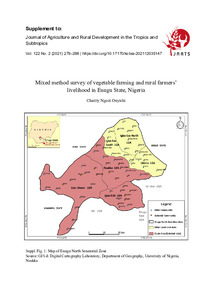| dc.date.accessioned | 2021-12-13T10:41:44Z | |
| dc.date.available | 2021-12-13T10:41:44Z | |
| dc.date.issued | 2021-12-07 | |
| dc.identifier | doi:10.17170/kobra-202112035147 | |
| dc.identifier.uri | http://hdl.handle.net/123456789/13432 | |
| dc.language.iso | eng | eng |
| dc.rights | Namensnennung 4.0 International | * |
| dc.rights.uri | http://creativecommons.org/licenses/by/4.0/ | * |
| dc.subject | rural farming | eng |
| dc.subject | food and nutritional security | eng |
| dc.subject | socio-economic empowerment | eng |
| dc.subject | support systems | eng |
| dc.subject | community based organisation | eng |
| dc.subject.ddc | 300 | |
| dc.subject.ddc | 630 | |
| dc.title | Mixed method survey of vegetable farming and rural farmers’ livelihood in Enugu State, Nigeria | eng |
| dc.type | Aufsatz | |
| dcterms.abstract | Studies on the role of agriculture on the improvement of livelihood of farmers have primarily focused on staple crops. Increased awareness on the importance of vegetables in urban and rural areas in Nigeria has led to a rise in demand of vegetables. In both rural and urban communities, smallholder farmers are responding to this demand by increasing vegetable production and thereby creating economic opportunity for themselves. The purpose of this paper is to assess the role of vegetable farming on rural farmers’ livelihood and the support systems available for rural vegetable farmers in Enugu state, Nigeria. This study adopted a mixed-methods design. Quantitative data collection involved the use of questionnaires (n=1118) and qualitative data collection methods comprised in-depth interviews and focus group discussions (n=33). The study revealed that even with limited institutional support, vegetable farming has led to an improvement of rural farmers’ livelihood. The findings indicated that through vegetable farming, rural farmers increased on-farm income and were able to establish other businesses. Also, vegetable farming increased food security of farmers’ households. The study also revealed that community based organisations (CBOs) are the major source of credit for the rural farmers and there is preponderance of farmer to farmer transfer of seeds, technology and information. Therefore, agricultural interventions should also be targeted towards strengthening the vegetable sector. | eng |
| dcterms.accessRights | open access | |
| dcterms.creator | Onyishi, Charity Ngozi | |
| dc.subject.swd | Nigeria | ger |
| dc.subject.swd | Landwirtschaft | ger |
| dc.subject.swd | Ländlicher Raum | ger |
| dc.subject.swd | Lebensunterhalt | ger |
| dc.subject.swd | Gemüseproduktion | ger |
| dc.subject.swd | Ernährungssicherung | ger |
| dc.subject.swd | Empowerment | ger |
| dc.subject.swd | Unterstützung | ger |
| dc.type.version | publishedVersion | |
| dcterms.source.identifier | eissn:2363-6033 | |
| dcterms.source.issue | No. 2 | |
| dcterms.source.journal | Journal of Agriculture and Rural Development in the Tropics and Subtropics (JARTS) | eng |
| dcterms.source.pageinfo | 279-288 | |
| dcterms.source.volume | Vol. 122 | |
| kup.iskup | false | |



